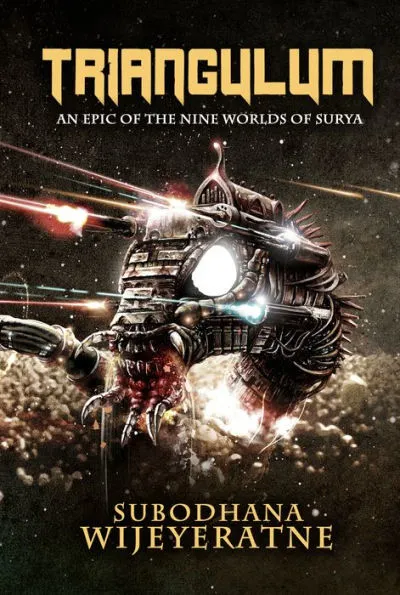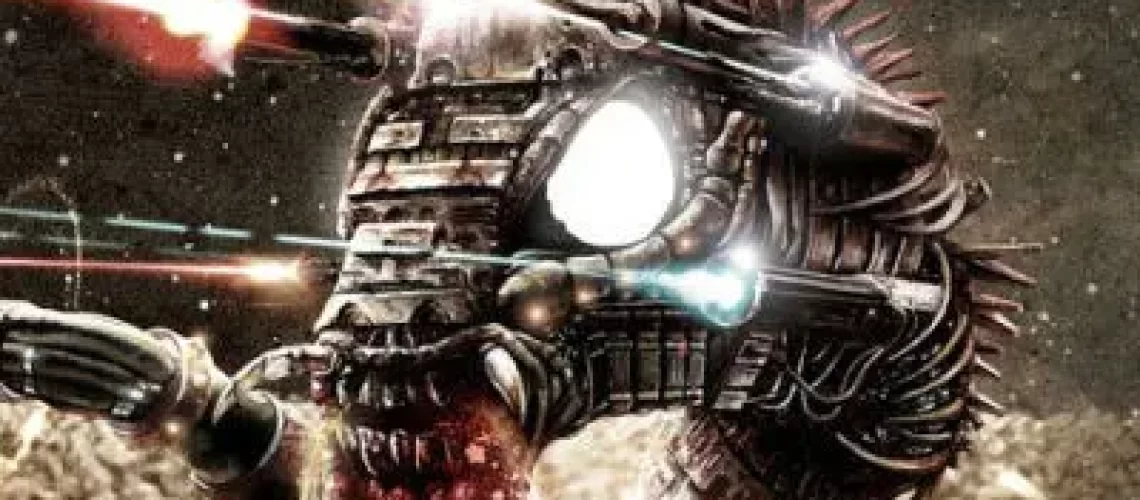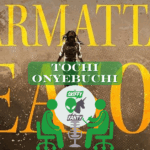For thousands of years, humanity has been ruled by the gods, whose authoritarian power and presence spread throughout the Surya system that humanity has settled. The Dawn sits atop the hierarchy of Triangulan deities, controlling her commanders and regents who oversee Prithvi (the blue and green cradle of humanity) and extend her authority throughout the nine worlds from Shukra to Yama. Humans barely remember the time before the gods arrived and put a forceful stop to human interspecific conflicts. But times are again changing. The Night has arrived aboard a living ship, the Triangulan vimana Skōlex, intent on completing a task begun long ago: ending the reign of her sister, The Dawn. Meanwhile, some humans begin realizing that these aliens from afar are not all that the deities masquerade to be.

On Daitya, a refugee family from Prithvi is tricked into captivity as slaves, with Indra, the young son, becoming castrated and sold to serve the powers as a librarian. Before being sold on Daitya, Indra befriends Kadrū, who is also sent off planet to serve a sororal cult of sorts. As a librarian, Indra meets the Little Princess of Yama, whose family takes interest in an AI in the library’s care, a mind that hails from that ancient time when the Triangulans arrived, and humanity attempted resistance. The lives and destinies of these three young humans become intertwined with The Night, while the King of Yama takes the AI for his own goals for the future.
Triangulum is exactly as its subtitle advertises: An Epic of the Nine Worlds of Surya. It’s a cerebral space opera set on a large scale with multiple protagonists and antagonists vying for control. Sometimes, the lines between protagonist and antagonist can become blurred, as can the nature of their moralities. As the summary above should indicate, the novel is heavily steeped in Hindu religion, with Hindi names and terms ubiquitously present for characters, planets, or other objects. Sometimes the meaning or English corollaries to the Hindi are explicitly mentioned in the text (though not usually at their first appearance.) Other times the information could be gleaned from context. But, it also will help anyone unfamiliar with the Hindi terms or source traditions to have a search bar or other reference handy.
This is the second novel from Wijeyeratne, though I haven’t read his debut, The Slixes, nor have I read any of his short fiction to my recollection. There are three qualities of Wijeyeratne’s writing that Triangulum quickly establishes: 1) there’s an intelligent and philosophical edge to the themes he explores through space opera politics; 2) his density of ideas and world building is well balanced with artistic prose that provides exquisite reading pleasure even when plot bogs things down; and 3) the Hindu framework for his writing is carefully researched (with a nice bibliography provided.)
I generally agree with the cover and marketing blurbs for Triangulum as provided by several respected SF authors. The novel is captivating, maintaining a fresh originality in voice and plot despite the well trodden space opera sub-genre. The biotech aspects of the world building are intriguing, and I especially adored the AI character, whose proximity of personality to the humans of our present-day reality holds more familiarity to a reader than the ‘regular’ human characters of this far-future setting. However, I wish the biopunk elements here had been more integrated into the plot of Triangulum, or the behavior of the characters – something beyond stylistic color.
The central conceit of the novel’s plot and setting is that the Triangulan empire aliens arrived to our solar system to find a slowly expanding humanity that was limited by infighting. They exerted total control and exploitation of these humans, and embedded that control into human culture, by stealing the elements of Sanskrit texts and acting as if they were the same gods of Indian yore. An intentional Ancient Aliens redux of sorts. As a result of this masquerade, the aliens don’t really come across as alien very often in the novel, instead seeming more like the figures of Indian epic legends. At the same time, by immersing the trio of young human characters into The Night’s sphere of influence, the humans quickly become cogs within that ruling class, more like the aliens. In other words, the alien and human characters start to read too much alike. For all the brilliance of Triangulum, I was most disappointed by the characters who always seemed very distant and hard to connect with. The characters all have tremendous arcs, but I can’t honestly say I cared much of what happened to anyone in the novel after the first third. Well, except the aforementioned AI, he was fun.
The density of plot, characters, and ideas in Triangulum, as well as the rewards of reading the novel and pondering its themes and philosophies of human behavior, come partially from Wijeyeratne composing it as one work. The novel could have easily been tooled into a trilogy, with each of its three main parts going toward a single novel. On one hand that would have given everything and everyone a space to breathe from the ambition. A slower progress for the characters could have eased the development of my empathy for them. More room would have been there to more deeply integrate the biopunk, or lower the slope of learning needed for initiates into Hindu religious characters or traditions or the Hindi language. Yet, on the other hand that would have drawn out the overall impact of this as a contained story, and likely necessitated incorporating additional conflicts and resolutions for clearer dividing lines between separate volumes.
Triangulum has so much to it that it’s difficult, nigh impossible to do everything perfectly or to meet reader expectations very broadly. Fans of intelligent space opera (i.e. something beyond simple trope-filled adventures set in space) are the most likely to enjoy this novel. Anyone interested in concepts and deities from the Hindu religion would also find this intriguing and entertaining, whether space opera is their bag or not.







